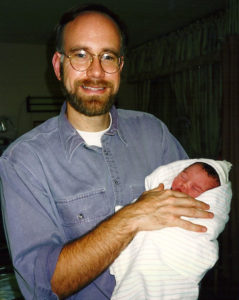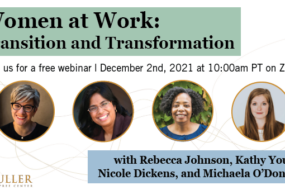December 20, 2016 • Life for Leaders
And [Mary] gave birth to her firstborn, a son. She wrapped him in cloths and placed him in a manger, because there was no guest room available for them.
Luke 2:7

Mark Roberts holding his daughter. Photo used by permission from Mark D. Roberts. All rights reserved.
Okay, here I go again, talking about women’s work. You may recall that the devotion from last Friday focused on this theme. As we examined Luke 1:57-58, we considered the implications of Elizabeth’s giving birth to John (who will come to be known as John the Baptist). Connecting this passage with Genesis 1, we saw that giving birth is an essential element of human work. It is literally being fruitful and multiplying and filling the earth. To be sure, giving birth is basically women’s work. Men can help, and, of course, they play a crucial role in conception (with one major exception!). But when it comes to bearing children, women do the heavy lifting (or heavy laboring!).
In Luke 2:7, once again a woman gives birth in the Christmas narrative. This time the woman is Mary and the baby is Jesus. Luke tells us that, after Jesus was born, Mary also “wrapped him in cloths and placed him in a manger, because there was no guest room available for them.”
As I reflect on this passage in relationship to work, I’m struck by a couple of things. First, I’m reminded that giving birth, though an absolutely crucial aspect of human work, is just the beginning of a much longer process of raising children. Mary didn’t just deliver Jesus into this world and then go back to her otherwise unchanged life. Rather, she also began to care for Jesus, “wrapping him in cloths” and laying him in a manger. My point is simple and obvious, but worth noting, nonetheless. The “women’s work” associated with children begins with birth, but continues on for years as women do the work of mothering.
Second, as I consider Luke 2:7, I wonder why Joseph didn’t do the wrapping and “mangering” of Jesus. Why did Mary do this? Now, in fairness to Joseph, he may well have been preoccupied with other essential tasks (cleaning up, placing new hay in the manger, keeping the animals away, etc.). Or, perhaps in first-century Jewish culture the mother always wrapped her baby so that Joseph wouldn’t have thought to do it. Now, of course, we live in a different culture with different assumptions and practices. Now, husbands and fathers are more deeply engaged in the work of parenting. Birth may still be primarily women’s work, but raising children is the duty, privilege, and calling of both mothers and fathers. (Of course, sometimes children do not have two parents. That’s where the people of God can step in and become like mothers and/or fathers to those whose family life is limited. In the photo, I am holding my newborn daughter, Kara. The nurse did the wrapping, but I did plenty of holding. Yes, it was work, and also one of the greatest joys of my life. I still love embracing my grown-up daughter, though I don’t carry her in my arms anymore.)
Once again, I want to point out that giving birth and raising children is central to human work. The Christmas story reminds us of this, doubly. No matter what you do for a living, if you have children, especially children who are not yet adults, then being a mother or father to them is an indispensable element of the work to which God has called you. Helping children to grow in stature, wisdom, skill, kindness, and faith is not just women’s work. It is the work of fathers and mothers, and, indeed, of the body of Christ together.
QUESTIONS TO CONSIDER:
If you are a parent, do you think about your parenting as part of your work, your life’s calling? Why or why not?
If you are not a parent, how are you in some way contributing to the raising of children (through your work, your church, your friendships, your family, etc.)?
Is your workplace supportive of those who are parents? In what ways? Are there things you can do in your work environment to help employees in the vital work of parenting?
PRAYER:
Gracious God, thank you for Mary’s work – her labor! – in giving birth to Jesus. Thank you for her faithfulness and strength. And thank you for the tiny window we get to see her working as the mother of Jesus.
Lord, please help those of us who are parents, both mothers and fathers, to be faithful in this crucial aspect of our work. And help those of us who are aunts and uncles, grandmothers and grandfathers, friends and teachers, to embrace our calling to raise children to know and serve you, and to make a difference in this world as your kingdom people.
All praise be to you, Gracious God, our Heavenly Father. Amen.
Explore more at the Theology of Work Project online Bible commentary: Jesus the Messiah (Matthew 1-2)

Dr. Mark D. Roberts is a Senior Strategist for Fuller’s Max De Pree Center for Leadership, where he focuses on the spiritual development and thriving of leaders. He is the principal writer of the daily devotional, Life for Leaders, and the founder of the De Pree Center’s Flourishing in the Third Third of Life Initiative. Previously, Mark was the Executive Director of the De Pree Center, the lead pastor of a church in Southern California, and the Senior Director of Laity Lodge in Texas. He has written eight books, dozens of articles, and over 2,500 devotions that help people discover the difference God makes in their daily life and leadership. With a Ph.D. in New Testament from Harvard, Mark teaches at Fuller Seminary, most recently in his D.Min. cohort on “Faith, Work, Economics, and Vocation.” Mark is married to Linda, a marriage and family counselor, spiritual director, and executive coach. Their two grown children are educators on the high school and college level.




